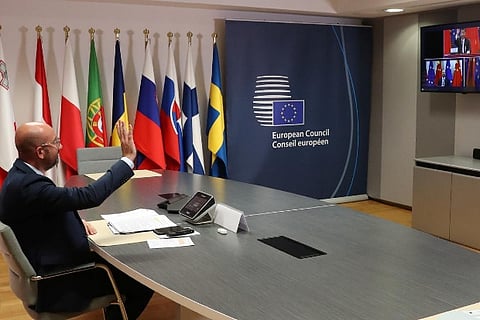

Chennai
As Brussels and Beijing struggle to agree on climate protection and trade, the coronavirus pandemic has exacerbated their differences. The longer the two sides talk, the more China benefits. When the EU-China summit finally took place via video conference, three months later than planned, not much actually came of the meeting, the first of a series scheduled for 2020. President of the European Council Charles Michel, President of the European Commission Ursula von der Leyen and Chinese Prime Minister Li Keqiang conferred for over six hours, with Chinese President Xi Jinping occasionally intervening. Afterward, China’s state-run television said the prime minister had said, “cooperation with the European Union outweighs competition.” “Engaging and cooperating with China is both an opportunity and necessity,” Michel and von der Leyen said in a statement. With neither side interested in stirring up trouble, the two agreed to together more closely to try to develop a vaccine for the novel coronavirus, as well as to finalise the investment agreement that they have been working on for over six years. This will not be easy, however.
No joint declaration
“We continue to have an unbalanced trade and investment relationship,’’ said von der Leyen after the digital meeting, during which the main bones of contention were the skewed market access for EU companies in China and China’s handling of the coronavirus pandemic. China also sees the relationship as being unbalanced, pointing out that the EU has been able to invest much more in China over the years than the other way around and lamenting the fact that the EU gets involved in what China regards as domestic affairs, for example with regard to Hong Kong. Considering these views, it was not that surprising that there was no joint Chinese-EU declaration at the end of the summit.
What is clear is that the EU’s China year, the highlight of which was supposed to be a big summit in Leipzig in September, which has also been postponed, is not going as Brussels would have hoped. Not only does the eurozone face the most significant economic challenges in decades in the wake of the coronavirus pandemic, it has also become blatantly obvious how dependent it is on China. Beijing repeatedly made this point, saying that although the EU was China’s biggest trading partner until recently, it had been pipped to the post by the Association of Southeast Asian Nations (ASEAN) in the first quarter of this year.
In Beijing, there seems to be an assumption that this will remain the case for some time as Asia looks set to recover more quickly from the pandemic than the EU. A pan-Asian free trade agreement is supposed to be sealed this year. The shift of power is not making it any easier to work on the EU-China Comprehensive Investment Agreement that Brussels and Beijing have been fine-tuning.
German Chancellor Angela Merkel had hoped the agreement would be signed in September. As Germany prepares to take up the six-month presidency of the Council of Europe next week, she has placed China at the top of her international priorities. Von der Leyen has requested that a draft be ready by early fall. However, for this to happen Beijing will have to agree to “substantial obligations” regarding transparency in technology transfer and subsidies for Chinese businesses that shut out foreign businesses from the market.
It was clear from the summit Beijing will not simply do as Brussels wants. China’s priority is to stabilise its own economy and fight unemployment. It is willing to put the Paris Agreement’s climate goals on hold. This year, Beijing has already approved as many new coal power plants as in the whole of last year. The major emissions trade scheme that it had announced is currently on the backburner. While climate activists fear that climate goals will not be met, economic planners worry that strict regulations to protect the environment would only further curb economic growth. The latter tend to be those with a say.
— This article has been provided by Deutsche Welle
Visit news.dtnext.in to explore our interactive epaper!
Download the DT Next app for more exciting features!
Click here for iOS
Click here for Android